By Abbey von Gohren
It is dark. Even when we turn on the lights these days it is dark. My friend from across the alley who is four-and-a-half-years-old came for a visit the other day and asked a good question: why is the light so dark?
Why indeed.
We have a tendency now to pick up anything warm and drink it, be it coffee, bone broth, candlelight. I almost reached for the glass jar alive with flickering flame instead of the mug to swallow it this morning. There’s an idea: gulp down the light and let it burn slow inside.
We attend. There is tension in the air. We poke at our little fires here and there — whistle a song, rub someone’s weary shoulders. As the Okee Dokee Brothers say, keep that The Hope Machine running strong. But the wait stretches on. The outer realities stretch us within, expanding time and our own capacities. We think we can’t wait any longer and then we do.
My sorrow’s flower was so small a joy
It took a winter seeing to see it as such.
Numb, unsteady, stunned at all the evidence
Of winter’s blind imperative to destroy,
I looked up, and saw the bare abundance
Of a tree whose every limb was lit and fraught with snow.
What I was seeing then I did not quite know
But knew that one mite more would have been too much.
— “After a Storm” by Christian Wiman
Solstice, Solace, Solitary.
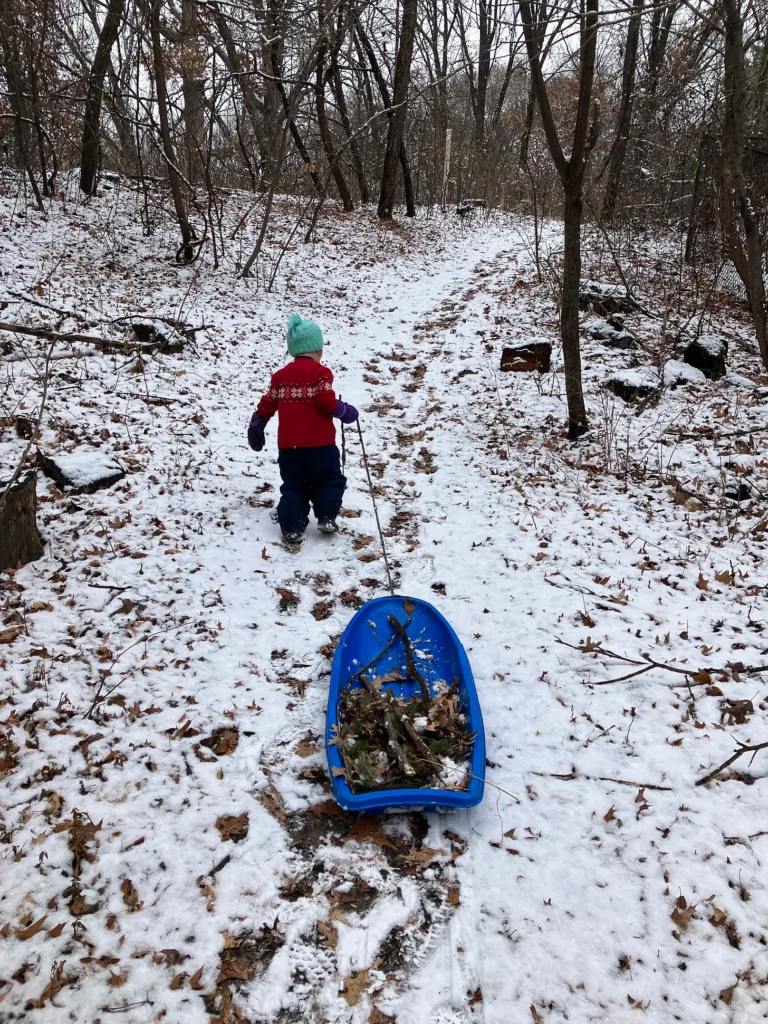
There is something in the word solstice that has always strongly suggested solace to me, however misconstrued an etymology that might be. Solstice is from Latin sol (sun) + sistere (to stand still). The sun stands still. My neighbor always has her kids trace their shadows on the driveway with chalk at noon in that long moment. Solace is the Old French word solaz which means “pleasure, entertainment, enjoyment” which is of course what they’re having as they laugh at their goofy, distended outlines.
In contrast, there’s many a winter day I’ve spent feeling solitary, a lone soul under the great sun immovable and impersonal.
My winter walks used to be almost exclusively alone in fact. This is a practice to be recommended but sometimes you want company. Thankfully it was two of us who set out with a sled this week into the first covering of snow. My youngest son scouted the landscape, puttered, pulled, examined, collected. All the while I was feeling the familiar twitch to grab my phone to connect with — something, someone. To take a picture, check my texts, to look up a tree online. How about I just look — up a tree?
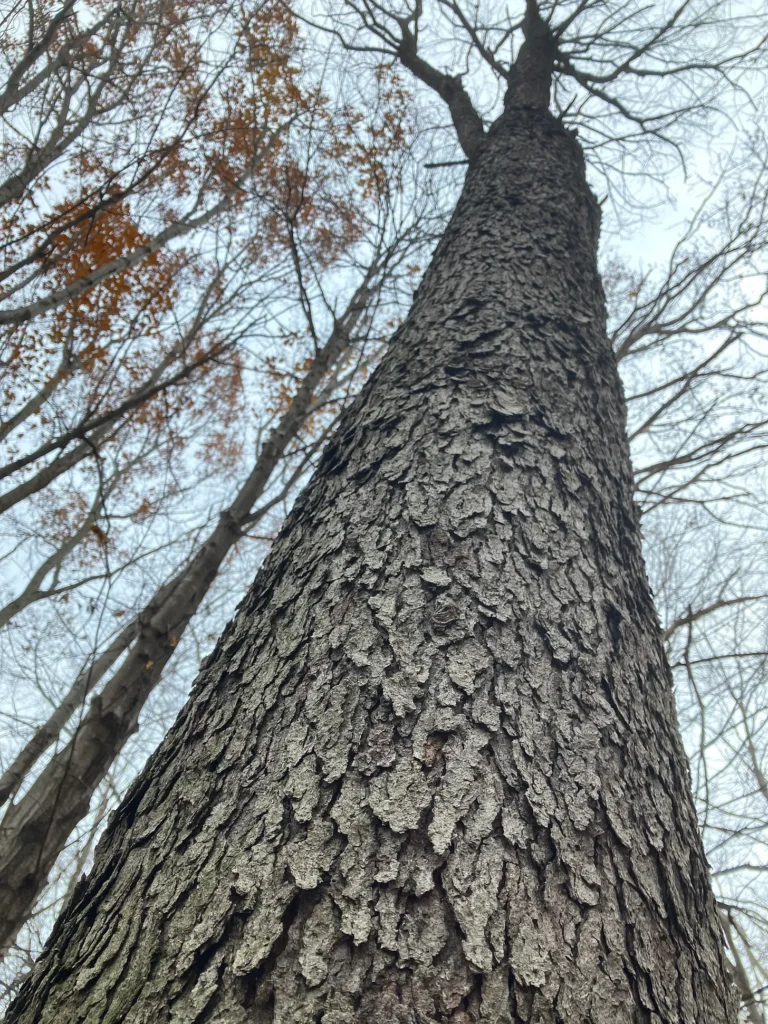
I also had to keep myself from dominating my companion’s moments. Come over here! Look at this! Follow me! He was clearly having his own adventure. I was free to have my own. We could move in parallel and find solace in silent intimacy. “Listen much, speak little.” I was left to my own feet, mind and hands. I didn’t even have a sled to distract me and had promised myself to bury my silenced phone in a pocket.
In My Bright Abyss, Christian Wiman’s memoir of suffering and light, there is a chapter which bears the same name as the poem I quoted above: “Sorrow’s Flower.” What does he mean by this poetic little turn of phrase? He says:
Christ comes alive in the communion between people. When we are alone, even joy is, in a way, sorrow’s flower: lovely, necessary, sustaining, but blooming in loneliness, rooted in grief. I’m not sure you can have communion with other people without these moments in which sorrow has opened in you, and for you; and I am pretty certain that without shared social devotion one’s solitary experiences of God wither into a form of withholding, spiritual stinginess, the light of Christ growing every fainter in the glooms of self.
Loneliness, when it passes through love, assumes an expansiveness and active capacity.
Sorrow blooms. I expand in love.
Waiting’s Work.
What are you waiting for? If you’re anything like me it’s down to brass tacks most days. The email response. Income. Bedtime. The thing to get fixed. The time and urge to write. Respite from sickness for that family member. A job for that friend. Some glimpse of sun.
We have watched life drain away slowly and brightly and the chlorophylls gave way to the bright yellow xanthophylls, carotenes and red anthocyanins which have in turn now rotted to brownish detritus. (It’s okay, go ahead and sigh.) A year ago I was waiting for rescue out of straight up despair. During a bout of postviral blues my mind decided to go for the gold and additionally relive the grief from the loss of two pregnancies that year. I was struggling just to get out of bed and take care of my kids, not to mention teaching part-time for a friend who had just birthed her firstborn. At least I can still inspire young minds in the classroom I told myself. Little did I know that the one place I still felt fertile — in the classroom — would also be whisked away shortly in an unforeseen, unfortunate maelstrom of forces beyond my control.
Trim the wick so the candle burns steady. Shed the curlicue of blackened wick, it is yesterday. It is loss and already gone. It causes the flame to flicker like a bulb with bad wiring. Trim the wick.
Come to earth to taste our sadness says the old song. An even older song, the cry of a prophet, screams oh that you would rend the heavens. Can we do something about these skies please? All I see is a blank sheet of grey and nothing to grab onto. How shall we pull it down ourselves? Make something happen? Manifest our own destiny by force of imagination and hand? The Hope Machine only gets you so far.
This is the crux of issue for me at least — a cross to bear and a crossroads where I balk at my next turn. I would like to produce fruit. I would like an appropriate outcome and result from my steady input. But when is life ever that predictable, direct, manipulable? Can I somehow become detached from the fruits of my actions so that I may be, in the words of Simone Weil:
only an intermediary between the uncultivated ground and the ploughed field, between the data of a problem and the solution, between the blank page and the poem, between the starving beggar and the beggar who has been fed.
We are so accustomed to thinking of cause and effect, tit-for-tat, reward for good deeds and punishment for bad. But Love runs the show otherwise. We long for an answer to the question what shall I do? Outside of the times of abundance when the belly swells, the barns burst, and mouths overflow with grateful gasps direct from the heart, where do we look for confirmation? How do we know whether the work of our hands matters in the world?
Simone, again:
With all things, it is always what comes to us from outside, freely and by surprise, as a gift of fate without our having sought it, that is pure joy. In the same way real good can only come from outside ourselves, never from our own effort. We cannot under any circumstances manufacture something which is better than ourselves.
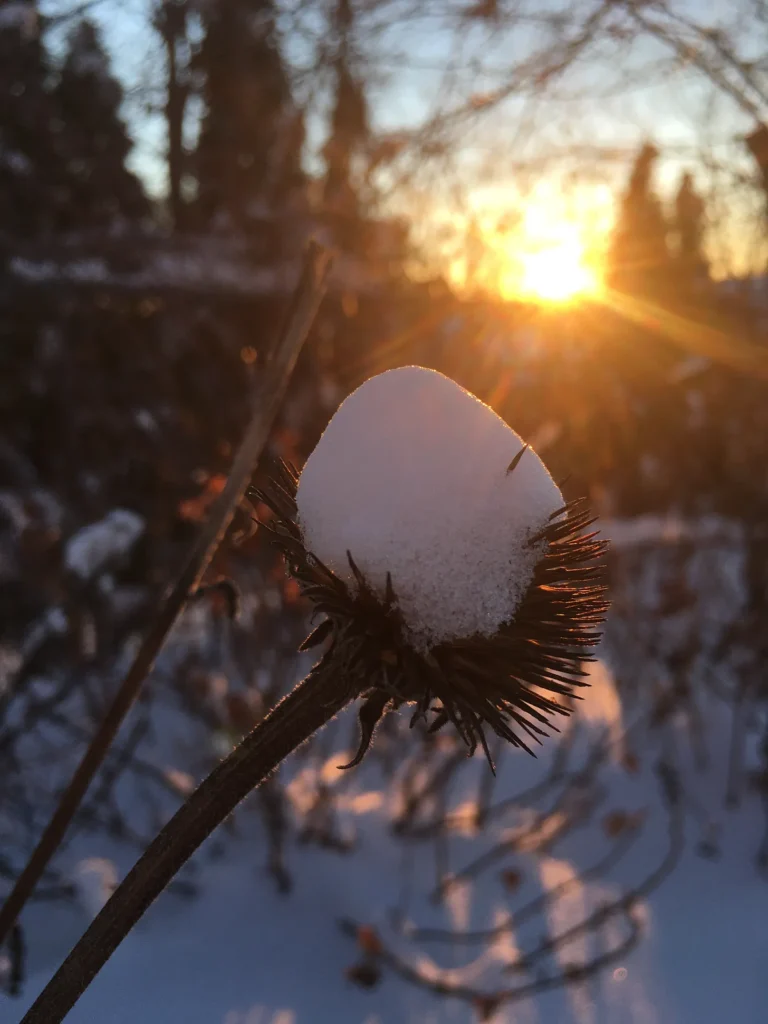
I ponder the stubbly fields emptied of crops and let my own heart undergo its own ground-clearing, paltry expectations whisked away. The prophet’s word echoes with we all fade like the leaf and our iniquities like the wind take us away but also the part where he says you did awesome things that we did not look for. This is the reality which slowly works its way into the soil and churns away hidden, silent.
Here is Simone again:
Thus effort truly stretched towards goodness cannot reach its goal; it is after long, fruitless effort which ends in despair, when we no longer expect anything, that, from outside ourselves, the gift comes as a marvelous surprise. The effort has destroyed a part of the false sense of fullness within us. The divine emptiness, fuller than fullness, has come to inhabit us.
Something is going on under a blanket of dead leaves and snow when we no longer expect anything. The false sense of fulness is being done away with, done to death by the cold hard season. Sorrow’s flower is in full, ice-crystal-fringed blossom. Perhaps it is not so much barren as bare. Spare. Someone just pointed out that winter is a season of seeing more clearly, the tree’s crowns being shorn. The bare abundance / of a tree whose every limb was lit and fraught with snow.
Here is where our hearts become more capacious. Here our emptiness, Love’s holy habitation.
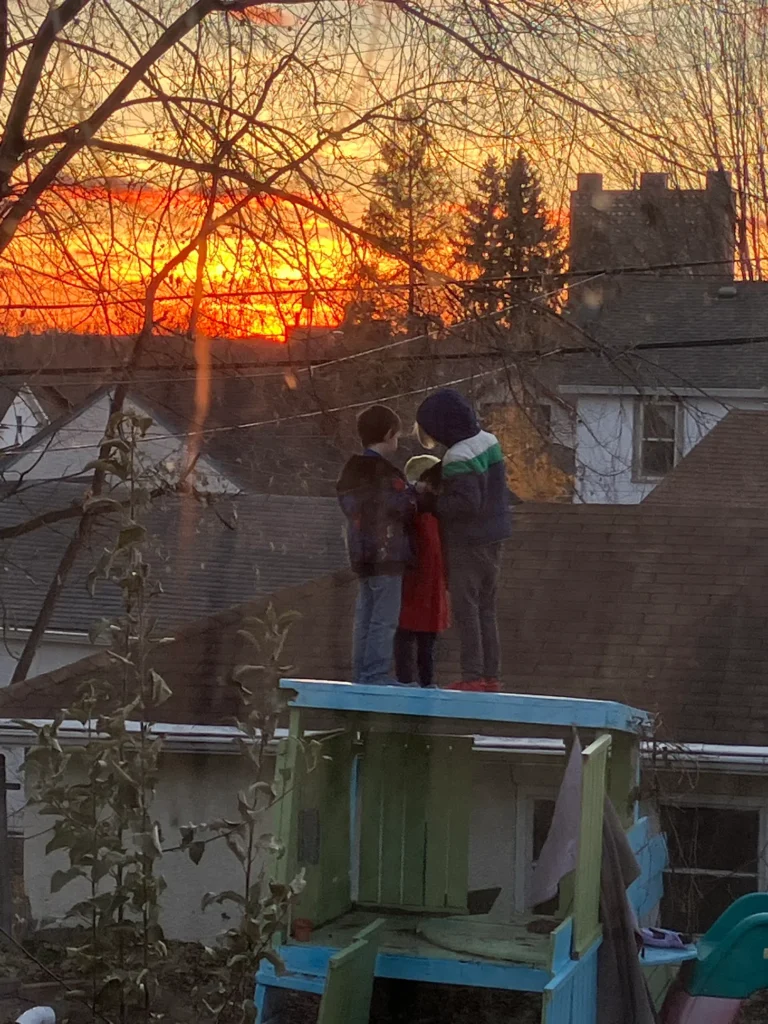

Abbey von Gohren is managing editor of Veritas Journal and writes regularly at her substack Heart Before the Course. To borrow a couple lines from George Herbert, she seeks to better notice “God’s breath in man returning to his birth” with her “soul in paraphrase, heart in pilgrimage.”
Header Image: by the author
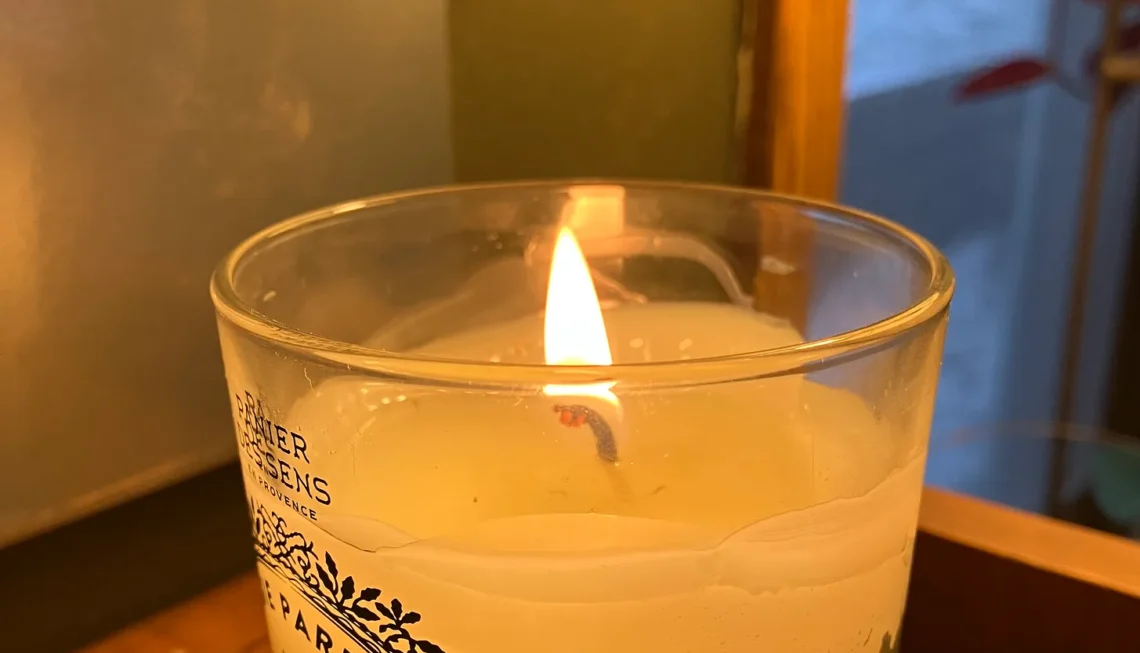


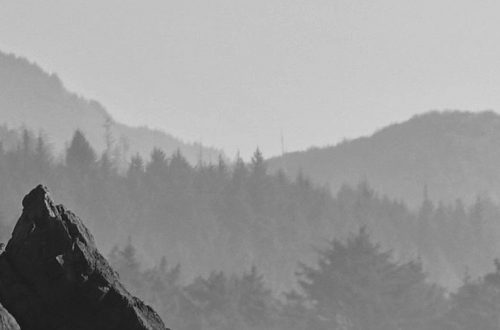
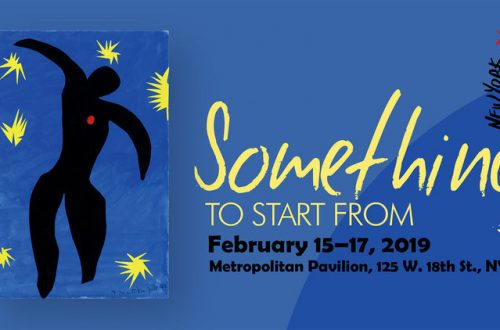
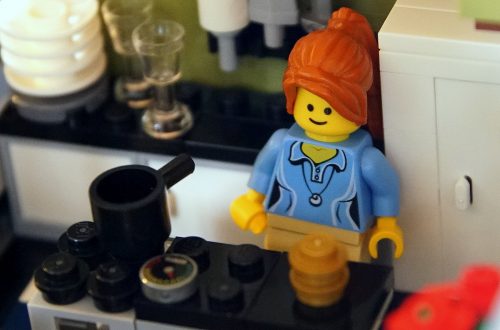
One Comment
Henry Lewis
Very nice. There is a sweet abandonment in letting go, the place of waiting Simone speaks of, a place where we have left aside our own efforts – they are so futile – and come to wait His appearing. And it will be unique to each of us, the way He comes and fills us. Here is the Good Simone speaks of and here is the calm and serenity.